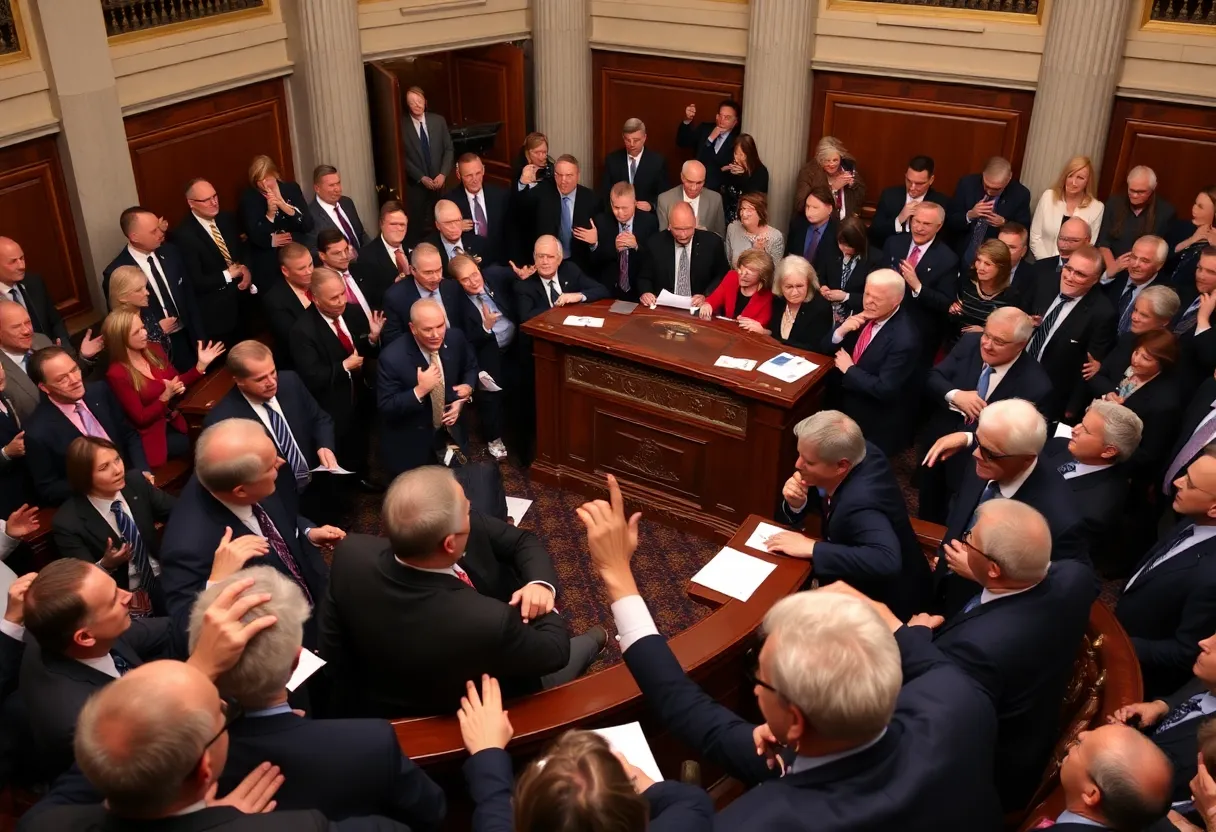News Summary
The Senate is in a state of unrest as a major domestic policy bill faces uncertainty. Republican leaders support it, but divisions within the party and opposition from Democrats complicate its passage. Key senators express concerns over financial ramifications and social implications, particularly regarding Medicaid cuts and tax increases. With the House version passed and a deadline approaching, the intensity of the debate surrounding this bill is increasing, making its future unpredictable.
Senate in Turmoil Over Domestic Policy Bill
The Senate is buzzing with activity as a significant domestic policy bill pushes its way through, but don’t hold your breath just yet! Republican leaders are rallying around this bill, but its future in the Senate looks more uncertain than ever. With divisions among the party’s members and stiff opposition from Democrats, the road to passage could be a rocky one.
Republican Opposition Stirs Trouble
Two Republican senators have already publicly declared their disagreement with the bill: Thom Tillis of North Carolina and Rand Paul from Kentucky. With such a slim majority in the Senate, Republicans can only afford to lose three votes. If things go awry, it could force Vice President JD Vance into the role of tiebreaker, adding an extra layer of intensity to the situation. If just one more Republican senator sides against the bill, the chances of its passage could nosedive.
Undecided Senators Add to Tension
Several senators are still on the fence about the bill, including Lisa Murkowski from Alaska, Rick Scott of Florida, Ron Johnson from Wisconsin, Mike Lee in Utah, and Cynthia Lummis from Wyoming. The heart of the matter for these undecided members seems to be the bill’s potential repercussions on their states. For instance, Senator Murkowski is particularly concerned about how the legislation might negatively impact Alaska’s economy and its residents.
In addition, some conservative members are pushing for amendments that would deepen cuts to Medicaid. This is causing worry among those who fear it could alienate voters who rely heavily on these essential services. Senator Susan Collins of Maine remains cautious, holding her cards close to her chest while seeking changes that involve increasing tax rates for wealthier Americans.
Financial Concerns Come to a Head
The ticker tape of financial implications surrounding this bill is raising eyebrows across the board. Some experts argue that it could add an alarming $3.3 trillion to the national debt over the next decade. Even more concerning is the projection that about 11.8 million people could find themselves without health insurance by 2034 if the bill is enacted. This is a matter that has not gone unnoticed—especially by constituents focused on economic issues.
Controversial Provisions Stir Debate
As discussions continue, there’s a flurry of criticism coming in from various corners. High-profile figures, including Elon Musk, have taken to social media to slam the bill, labeling it “utterly insane and destructive.” These heated remarks only add more fuel to the fire surrounding this already contentious legislation.
The bill itself is packed with substantial tax cuts, military spending increases, and Medicaid reductions. Imagine this: a total increase in the debt ceiling of $5 trillion—yikes! To garner support, the legislation proposes to scrap clean energy tax credits and ramp up work requirements for the Medicaid program. This multifaceted approach is designed to win over support but has left many scratching their heads in concern.
Race Against the Clock
The House has already passed its version of the bill, but with Senate modifications still pending, GOP leaders find themselves in a tight spot. They are desperately trying to reconcile the different priorities at play. This bill is viewed as a crucial piece of President Trump’s agenda, with a self-imposed deadline for passage looming before the Fourth of July.
Democrats have come out in full force against the bill, arguing that it disproportionately favors the wealthy while jeopardizing crucial federal programs that working-class Americans depend on. The Republicans, on the other hand, are feeling the pressure to deliver on promises made to their constituents while grappling with internal divisions over the bill’s fiscal impact and specific provisions.
As the discussions unfold, all eyes will be on the Senate to see how this domestic policy bill truly shapes up. Will it pass, face a tough defeat, or evolve into something else entirely? One thing’s for sure: the coming weeks will surely keep everyone on the edge of their seats!
Deeper Dive: News & Info About This Topic
- New York Times: Musk Critiques Trump’s Domestic Policy Bill
- Wikipedia: United States Senate
- NBC News: Senate Republican Bill on Trump’s Agenda
- Google Search: Trump Domestic Policy Bill
- New York Times: Senate Debates Trump’s Domestic Policy Bill
- Google Scholar: Trump Policy Bill
- New York Times: House GOP Tax Bill Linked to Trump
- Encyclopedia Britannica: Democratic Party
- New York Times: Republicans and Trump’s Populist Tax Cuts
- Google News: Trump Bill News

Author: STAFF HERE AUGUSTA WRITER
The AUGUSTA STAFF WRITER represents the experienced team at HEREAugusta.com, your go-to source for actionable local news and information in Augusta, Richmond County, and beyond. Specializing in "news you can use," we cover essential topics like product reviews for personal and business needs, local business directories, politics, real estate trends, neighborhood insights, and state news affecting the area—with deep expertise drawn from years of dedicated reporting and strong community input, including local press releases and business updates. We deliver top reporting on high-value events such as Arts in the Heart Festival, Westobou Festival, and Masters Week. Our coverage extends to key organizations like the Augusta Metro Chamber of Commerce and Greater Augusta Arts Council, plus leading businesses in manufacturing and healthcare that power the local economy such as Textron Specialized Vehicles, Cardinal Health, and Nutrien. As part of the broader HERE network, including HEREAtlanta.com and HERESavannah.com, we provide comprehensive, credible insights into Georgia's dynamic landscape.


